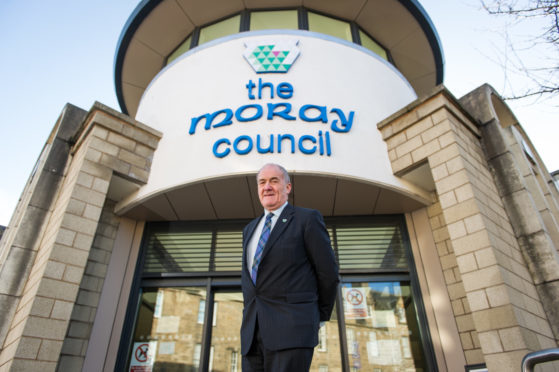When George Alexander accepted the task of leading Moray Council through financially turbulent times, he felt like he had been handed a “poisoned chalice”.
Only months after forming an administration comprising of six independent and eight Conservative councillors, things got worse when two members of the ruling group quit.
Both said they wanted no part in the painful series of cuts the administration was planning to impose in a drive to save millions and keep the body solvent.
Now, one year into office and having pushed through a controversial budget plan, the Forres representative says he is pleased with the progress made – but warned that further tough decisions lie ahead.
Mr Alexander said: “It has been a difficult year, with two of the original administration councillors deciding to abandon ship.
“This left us with exactly half of the full complement of Moray councillors taking responsibility for leading the council through some very challenging times.
“Seven of the remaining members of the administration group are new councillors who have been on a very steep learning curve, but I must congratulate them for the manner in which they have coped and I do believe that we have made progress.
“Undoubtedly the greatest achievement was to succeed in achieving a balanced budget, and this was largely due to the fact that the people of Moray recognised the difficulties their council was facing.
“They have played their part in responding to public consultations.”
Mr Alexander has continually argued that more central funding is required to prevent the council from enacting ever more swingeing cuts as it battles to save £10million over the next two years.
Council top brass recently met the Scottish Government’s finance secretary, Derek Mackay, to inform him about the authority’s dire financial straits.
But Mr Alexander nevertheless foresees a “very challenging year ahead, with further reductions in available finances”.
And the former maths teacher voiced his hopes that more elected members would side with him, despite the unpopularity that cutting services can bring.
He said:”I have never made any secret of the fact that I was surprised to find myself in the role of leader of the council.
“I have dedicated a huge part of my life to trying my best to deliver for the people of Moray but I see myself as a member of a team, and I wish that I could persuade more of my colleagues to join that team.”
Mr Alexander also praised the work of officers who helped oversee some of the region’s major achievements over the last year, such as the extension of the Macallan Distillery, the development of the Barmuckity Business Park, ongoing plans to expand RAF Lossiemouth and the opening of the new Elgin High School.
A year of comings and goings
The people of Moray voted overwhelmingly in favour of Conservative candidates last May – with all eight Tory hopefuls securing the lion’s share of votes in their wards.
They were joined by nine SNP representatives, eight independent councillors and one Labour member, John Divers.
However, the successful parties barely had time to celebrate before the balance of the authority was thrown into doubt.
In a startling about-face, independent member Sandy Cooper decided to resign just days after being elected.
It cost the cash-strapped council about £25,000 to replace the red-faced pensioner, and it was Conservative Maria McLean who took his seat and bolstered the administration’s numbers by joining.
The group’s joy at strengthening its advantage in the chambers was short-lived when Speyside Glenlivet member Walter Wilson quit both the ruling coalition and the Conservative party.
He labelled his former Tory colleagues “right wing extremists” amid claims that the penny-pinching budget they were working on would sacrifice public safety.
Heldon and Laich member, Ryan Edwards, soon followed Mr Wilson out the door citing “irreconcilable differences” about proposals to save £6million over the coming year.
Ahead of the budget meeting on February 14, protestors gathered outside the council’s Elgin headquarters with signs bearing slogans such as “don’t break Moray’s heart on Valentine’s Day”.
The savings package the administration eventually voted through led to reduced bin collections to save £83,000, a £740,000 reduction in education budgets affecting librarians, technicians and specialist teachers and a management restructure to save another £500,000.
